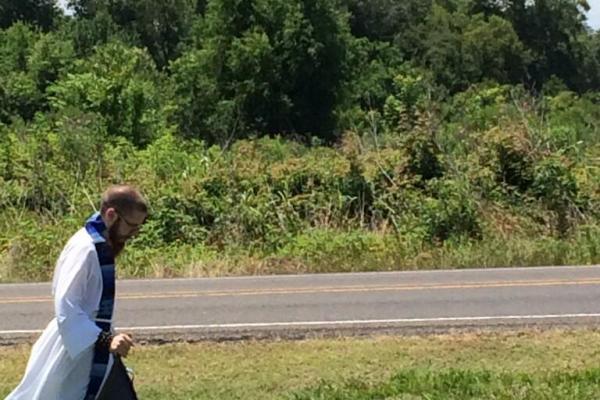It’s 93 degrees in Texas today. And Rev. Jeff Hood is walking 200 miles across the state. What would compel somebody to do that? He wants to end the death penalty … and he is not alone.
Rev. Jeff Hood is a Southern Baptist pastor, deeply troubled by his denomination’s stance on capital punishment. And he is troubled because he lives in the most lethal state in the U.S. Texas has had 515 executions since the reinstatement of the death penalty in 1976 – the next state in line is Oklahoma with 111. That means Texas is responsible for 37 percent of the executions in the U.S. Jeff has been a longtime organizer and board member for the Texas Coalition to Abolish the Death Penalty, a movement that is gaining some serious momentum these days.
A growing number of Texans — and Americans in general — are questioning the death penalty. A recent ABC poll shows we are over the tipping point, with more than half of Americans being against the death penalty and in favor of life in prison, putting death penalty support at a new low. For some it is the racial bias – in Texas it is not uncommon for an African American to be found guilty by an all-white jury. In fact, in considering “future dangerousness,” a criteria necessary for execution in Texas, state “experts” have argued that race is a contributing factor, essentially that someone is more likely to be violent because they are black – prompting articles like the headline story in the New York Times about Duane Buck: “Condemned to Die Because He is Black.”
For others, the issue is more of an economic one: Often the decisive factor on execution is not guilt or innocence but whether one is rich or poor … whoever doesn’t have the capital gets the punishment as the old adage goes. And for others still, it is the Constitutional part — the cruel and unusual element — as equal justice under the law should mean you get the same punishment for a crime done in Connecticut as in Texas, which is clearly not the case. More than 80 percent of executions come from 2 percent of the counties in the U.S. And more and more folks are feeling the cruelty of it all, wasting so much energy and resources on how to kill people to show that killing is wrong. In fact there has not been an execution since the botched Oklahoma execution over a month ago, which left a man writhing in pain for 45 minutes before he died of a heart attack. It’s not just liberals anymore, but all sorts of reasonable people (including conservatives and faith leaders) who are convinced that we can do better than this as a country … and we must.
For Rev. Jeff Hood it is his faith that drives him. As he likes to say: “The death penalty makes us both killers and victims. Only love can heal us.” He began his journey by meeting with the men on death row, for whom he is a spiritual advisor. As he left the prison he said, “The wind of God is at my back” and set out on the 200-mile journey through the desert.
I got to talk with him today, and he emphasized how his faith has shaped his views on the death penalty. We discussed the victims of violence, the heroic families like Murder Victims Families for Reconciliation and Journey of Hope folks who are further traumatized by the 10 years of trials and millions of wasted dollars that go toward each execution, and especially the fact that taking another person’s life does not bring back their lost loved ones.
Jeff and I also talked about Jesus, the lens through which we read the Bible and the world around us. He is haunted by the way Christianity has been misrepresented when it comes to execution.
“There is a cross on top of the execution chamber in Huntsville,” he said sadly. It’s a contradiction that not enough Christians recognize – Jesus was a victim of the death penalty, not a proponent of it. Jeff described his hope that if more and more Christians embraced Jesus’s life and teaching we would end the death penalty in America, for it’s strongest pillars are in the heart of the Bible belt. He is hopeful, and so am I.
As we ended the call, he described all the gracious hospitality he has received – folks bringing him gifts, water, food, and smiles. One of the congregations hosting him is United Methodist, whose church policy prohibits the death penalty: “We believe the death penalty denies the power of Christ to redeem, restore, and transform all human beings.” Amen.
One of his favorite stories was an encounter with one passer-by who stopped to talk with him, not entirely convinced of where she stood on the issue. He explained how Jesus’ command to love your neighbor as yourself and to love your enemies makes it difficult to execute, and she responded: “Damn, that makes a lot of sense.” Indeed it does.
The Gospel is good news. The merciful will be shown mercy. March on, brother Jeff. I hope with every step you take, every mile you walk, we get a little closer to the abolition of the death penalty in Texas, in the USA, and in the world. March on, brother, march on to the promised land.
Shane Claiborne is an author and activist, currently working on a book on the death penalty. You can find him at www.redletterchristians.org.
Got something to say about what you're reading? We value your feedback!
